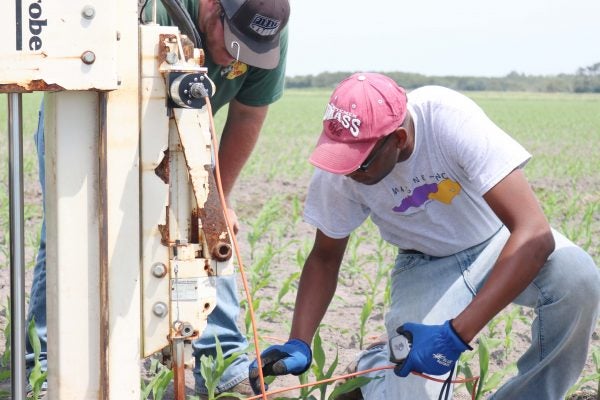ECU professor traveling to Zambia as part of Fulbright program

East Carolina University associate professor Alex Manda takes soil samples in Hyde County with a team of graduate students to test conductivity as part of his research into saltwater intrusion. Manda was awarded a Fulbright U.S. Scholar Award this spring that will send him to Zambia next year to assist in water quality testing of the African nation’s groundwater system.
An East Carolina University associate professor will travel to Zambia next year to assist in water quality testing of the African nation’s groundwater system.
Alex Manda, a hydrogeologist in the Thomas Harriot College of Arts and Sciences, has been awarded a Fulbright U.S. Scholar Award. The program is the federal government’s flagship international educational exchange system, designed to build lasting connections between the United States and foreign countries.
Manda – a native of Zambia – will spend eight months in the country studying the potential contamination of groundwater in the suburbs around the capital of Lusaka. Manda will assess the potential impacts of nitrates in untreated wastewater while engaging with stakeholders to help them better understand potential sources of contamination. He will also evaluate groundwater management approaches that may address elevated nitrate concentrations.
After visiting family members in April of last year, Manda said he felt like he was seeing the “wild west” of groundwater management. With new developments going up in the Lusaka suburbs, Manda said “every Jim and Jack” were drilling boreholes and wells to create water access with little professional oversight or thought toward the potential interactions with septic systems.
“People have been building out from the city center,” Manda said. “People are creating their own water resources because the government can’t provide resources that far out. They need water and sanitation, but the city just didn’t have the capacity to keep up with demand.”
Manda said that his research team would test nitrate levels in water systems used by those living in Lusaka’s suburbs. The higher the level of nitrates in the water, the greater chance of possible contamination leading to waterborne diseases.
Manda hypothesizes that during the rainy season, fluids from septic tanks drain into the surrounding subsurface material, pushing wastewater deeper into the ground. While wastewater sinks, the water table rises due to excess rain, allowing clean water to mix with contaminants.
Lusaka was left crippled in October 2017 when a cholera outbreak resulted in 98 deaths in the capital alone. A test of water sources in the region a year later found that the most commonly contaminated sources were shallow wells and boreholes.
“In some areas, we have very specific water quality issues, particularly with waterborne diseases like cholera and typhoid,” said Kawa Banda, one of Manda’s research colleagues in Zambia. “In the past, the capital has been paralyzed, and we’ve had to stop everything and try to contain outbreaks. It’s great that people are seeing the benefits of groundwater, but we do not have the services and infrastructure in place to keep up with the amount of development happening around Lusaka.”
Manda, who enters his 10th year at ECU this fall, said he hopes his research will help him uphold the Fulbright program’s goals of building relationships and leaders.
“ECU continues to grow its community engagement efforts,” Manda said. “This is a natural progression of our goals. I may not be directly affecting the Greenville community, but we’re helping the international community. We’re called to serve, whether it’s 10 miles from home or 7,000 miles away from home.”
###
ECU News Services
Howard House, 1001 E. Fifth Street
Greenville, NC 27858
ecunews@ecu.edu
Phone: 252-328-6481
news.ecu.edu
Contact: Matt Smith, University Communications, smithmatt17@ecu.edu
Telephone: 252-737-5423